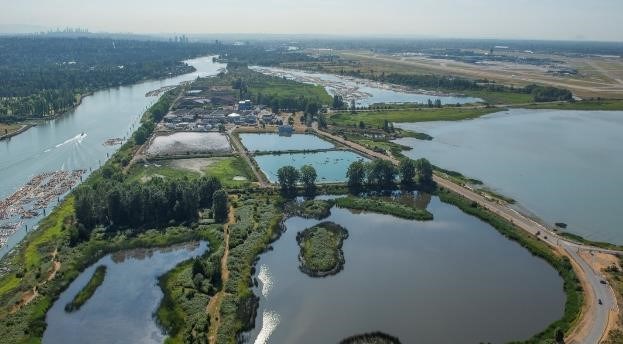Metro Vancouver’s board is calling on the federal government to invest $3.3 billion in a new wastewater facility and over $200 million to back the construction of affordable housing over the next decade.
The requests, made by board chair George Harvie before the House of Commons’ Standing Committee on Finance, comes as the federal government carries out consultation ahead of its 2023 budget. Harvie said Metro Vancouver last went to the federal government this summer, seeking $250 million for its share of phase one of the Iona Island Wastewater Treatment Plant project, the largest capital project in the region's history.
“They kept saying come back at a different time,” Harvie said. “Three times we’ve been turned down.”
“We’re really disappointed that the federal government hasn't provided funding towards the number one priority.”
The Richmond project, pegged more than $10 billion, is currently in the design and construction phase. Currently, the plant processes about 200 billion litres of wastewater a year from the surrounding municipalities of Vancouver, Burnaby, Richmond and the University of British Columbia.
The plant upgrade will siphon off carbon emissions to reuse elsewhere, protect the plant from earthquakes and sea level rise brought on by climate change, and bring the water discharged into the ocean up to federal standards.
Work on the Iona plant will continue in phases until 2039, the year of its expected completion. Those changes will boost the plant's capacity to provide services to another 170,000 people, beyond the 750,000 it already serves.
Harvie said the existing plant is in “terrible shape” and cannot meet new regulations the federal government has handed down. If the federal government fails to commit its $250 million soon and $3.3 billion over the life of the project, it would almost certainly destabilize sewage rates for millions of residents.
“We are desperate to try to get ahead of the curve here,” Harvie said. “Our job is to ensure that new growth has the services available for them.”
“Where we're at right now is we can't proceed unless we have federal funding.”
Andy Yan, head of Simon Fraser University’s City Program, said the debate over how to finance the massive infrastructure project comes as the metropolitan region is expected to absorb another million people by 2050.
“These are table stakes. How are you going to do that with a million new people and a changing environment for water? In this case, are we going to have enough? And how do we get it in and how do we get it out?” he said.
“This is where long-term planning at a regional level is critical.”
Metro Vancouver has a regional plan, but paying for that plan has become increasingly difficult. In March, the B.C. government announced it would provide $250 million toward the wastewater project. But a big gap remains, and Harvie said the bill for future growth shouldn't be put on to existing residents — one reason Metro is asking the province to approve development cost charges for new construction.
“It's just always the question who pays,” said Harvie. “We're firm on the belief that as developers develop new housing, growth should be paying for growth, not the existing residents that have been living in their homes for a number of years.”
The B.C. government recently invested $158 million to deliver 2,000 affordable units across the region. On Friday, Harvie also renewed Metro's call to the federal committee for another $166 million in financing and $40 million in forgivable loans. The regional body is asking Ottawa to sign an agreement to deliver a “full portfolio of projects over the next 10 years.”
Destabilizing otherwise predictable and affordable sewage rates would likely put added pressure on an individual's living costs in an already expensive metro area, all while climate change puts added pressure on the region’s ability to supply clean water, Metro says.
“It’s kinda like how strata councils work,” said Yan. “You can do this over a schedule of actions or you can ignore it and defer maintenance and then suddenly have emergencies occur.”
Meanwhile, the cost of new infrastructure is increasing. A portion of the Iona plant's hefty price tag comes down to timing. Over the next five years, Metro is expecting to spend $7 billion on several big capital projects outside of the Iona upgrades. One project includes delivering potable water under major rivers to the Fraser Valley; another plans to quench the region's growing water demands with a major new pipeline running from the Coquitlam Reservoir.
Strained supply chains — a hangover from the COVID-19 pandemic and high inflation — only add to those costs.
“The longer we wait, the more expensive it's getting,” Harvie said.




